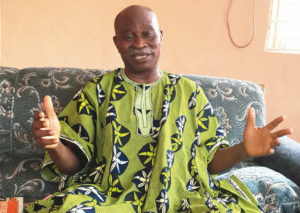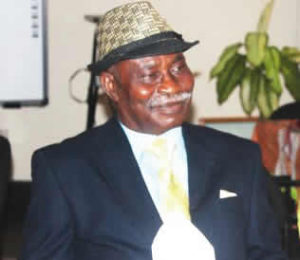News
As A War correspondent, We Were Told To Eat Dead People As Suya –Sobowale
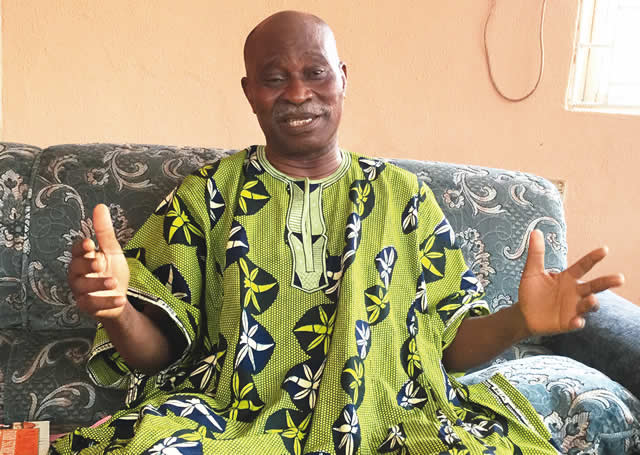
A veteran journalist and professor of journalism, Idowu Sobowale, in this interview with TUNDE AJAJA speaks about his growing up and life experiences
As someone born to a farmer and trader, what fond memories of growing up do you still have?
I retain very fond memories of my birth, upbringing and relationship with my parents when they were alive. I was born in a village in Ogun State. My father was a farmer while my mother was a petty trader. She was not the only wife of my father; he had three other wives, and whenever it was time to harvest his farm produce, everybody would assist. So, I was brought up in that tradition of following him to the farm, while my other siblings had gone to town. In no time, I also became a farmer, specifically when I was six. I remember that while carrying farm produce to the market, my neck would have sunk in by the sheer weight of the load, and how much would the load be; about three Kobo. I was doing that until when I was 13. One day, we got to the cocoa plantation and my father apportioned the work I would do, but I told him I was no longer interested in farming. I told him I wanted to go to town to become a mechanic. He couldn’t believe it because I had become so useful to him in the farm. He was devastated and immediately, we left the farm. When we got home, he relayed what I said to my mother, his sisters and his half brother. They wanted me to recount it but I refused and told them I would run away from home if they didn’t allow me to become a mechanic. When my siblings came home, he narrated the story and they said I should recount it. I maintained that I would run away if they didn’t allow me. They said I should not run away but wait till January when my brother would come to take me to Lagos. They said I would go to school for one year so I could be numerate towards my apprenticeship. On January 3, 1954, my brother came and took me to Lagos.
That day must have felt like another Christmas for you; leaving farming to become a mechanic…
(Cuts in…)I was so happy that my aspiration was being fulfilled. When we got to Lagos, I was so old that no principal or headmaster would admit me into primary one. I was 13 plus. I was born in 1941 and we are talking of 1954. There were not too many schools in Lagos Island then, so we went round every school but nobody would take me. They said I was already an old man, but somebody told my brother that at St. Peter’s School in Oyingbo, a teacher was going to conduct an entrance exam for pupils transferring from other schools to class two. My brother took me there and after discussing with the teacher, he told my brother to bring me the following day to take part in the exam. On getting there the following day, the sight of the blackboard nearly sent me to my grave. My heart just cut and it remained separated until the exam was over. They gave me a piece of paper and a pencil, but I didn’t even know how to hold the pencil, because I had never been to school. When I put the pen on the paper, I was just drawing what was absolutely meaningless. In the evening when we went to the man’s house to see the result, he said my brother should never bring me near a school again, that there was no way I could cope. I didn’t know how the discussion went between them but he told my brother to bring me the following day so I could come and start in class two. They gave him a list of things to buy, and when he was going to buy those things, he told me that if I failed in the first term, that would be the end of my schooling. In any event, I didn’t want to go to school; I wanted to become a mechanic, so it wouldn’t have mattered much.
How were you able to cope in class two without any previous education?
The teacher put me beside one small boy, Olanrewaju Samuel, in the class. I’ve been trying to locate him since then but I’ve not been able to. He was a genius; tiny as he was. Whatever exercise was on the board, he would finish well ahead of every other person. Then, he would take my paper and write mine too. So, I was getting the same mark he was getting. And I used to be second or third in the class. The teacher was wondering how I was doing so well, so he moved me to sit close to a female student, who wasn’t as brilliant as Samuel. She was struggling too, so there was no room to help anybody. I started copying what she was doing. If she got three, sometimes I would get one or two. Again, the man suspected that it was not my work, so he moved me again, all of these within one term. He moved me and paired me with one man who was much older than myself and who seemed to have spent so many years in school but didn’t go beyond that class two. He was the worst of us all, so there was no one for me to copy from. But, due to my brother’s threat, the urge to succeed was always nudging me on. At that time, the commercial buses we used to board were full of inscriptions, so I was struggling to read whatever they wrote on them. That was how I started learning. At the end of that term, I took the third position. I couldn’t believe it. I was so happy that I couldn’t wait to collect my result and the prize I won, but my cousin brought them home for me.
How did your brother receive the news?
In the evening, my brother called us and told us to present our result sheets. Others presented theirs, but when it got to my turn, he said, ‘dullard, where is yours?’ One of them gave him the report sheet and the prize and told him I did well. Instead of praising me, my brother queried why I was not the first or second. For the remainder of the three terms, I kept maintaining second or third, because Samuel’s first was constant. At a point, I changed school when Chief Obafemi Awolowo introduced free education. Throughout, it was only once that I took tenth position and that was because I didn’t bribe the teacher who came to relieve our mistress who went on maternity leave. He was openly demanding and I couldn’t meet his demand, so I took tenth position. Regardless of my explanations, my brother gave me six strokes of the cane. Apart from that occasion, I cannot remember when I took a second position, and whoever would be second to me would be a very distant second. I remember the remarks of my teacher, Mr. Z.I. Ogabi, who wrote in my report card that ‘let the parents of this boy encourage him further.’ That was how it started.
After your secondary education, you worked with Daily Times. What attracted you to journalism?
In my secondary school, there was one of our seniors, Ajibade Fasina Thomas, who was always reporting events around the school on a long sheet of paper. He would paste the news he had gathered everywhere. He was two years ahead of me and I was always admiring him. When he left the school, I just took over that task. In no time, people were looking up to me for information. My pen name was ‘Constant Show,’ which I just chose because I didn’t want to use my real name, and up till tomorrow, some of my classmates and my juniors still call me that name. That was how I first became a reporter. When I left school, I went to Lagos City Council to work with my Grade II secondary school certificate. I was working there when I met the late Chief Olabisi Onabanjo, a former governor of Ogun State, when he was released from detention over the treasonable felony charge against him and the like of late Chief Obafemi Awolowo and Chief Lateef Jakande. Chief Onabanjo was the Managing Director of Daily Express. I told him I wanted to come and work with him, but he said the newspaper was going to fold up but that he would give me a note to his friend, Alhaji Babatunde Jose, who was then the Chairman and Managing Director of Daily Times. I went with the note and on seeing the letter, Alhaji Jose signed on it immediately and said I should take it to their office on Cooper Road, Ikoyi. He said they were starting a training school that day. I ran there and truly 10 of us started the school that day. We were to be there for one year, but after a month, two of us, Dr. Tajudeen Ayodele Kekere-Ekun, now a dental surgeon and myself, were taken away from that school to the newsroom. They said we were performing excellently. We were attached to senior reporters and shortly after, I was covering assignments on my own. Later, I was posted to the airport as the aviation correspondent. I was getting exclusive stories for Daily Times like no man’s business.
And you were doing all that with your secondary education?
Yes, but one day, a colleague, Kola Adesina, who was working for WNTV/WNBC, called me and said I was making it but that I would not go far if I did not go back to school. I really didn’t appreciate what he said because my name was everywhere. Agbeke Ogunsanwo was the editor of children’s page then. She was one of those who spent one year in the training school, but she went to UNILAG for a diploma course. She came back and she was elevated. Then, Kola reminded me why I needed to go back to school. That motivated me to apply for diploma programme in UNILAG. Daily Times sponsored me for the programme. Instead of just focusing on the diploma programme, I also had my eyes on the degree programme. By the time we finished, I got all the prizes, including Daily Times’ typewriter for the best diploma student. Then, about six of us applied to transit to the second year of the degree programme. There was opposition from the degree students but our results spoke for us. In the second year, I won most, if not all the prizes, and then the Federal Government gave me a bursary award to complete the programme.
What then happened to the scholarship you were enjoying courtesy of Daily Times?
I wrote to Daily Times to stop the sponsorship so I could take the Federal Government’s scholarship. In the third year and final year, I got the best performance in the class and I won most of the prizes. Sometime later, the position of the Assistant Editor of Daily Times became vacant, which was created by a major reorganisation in the company. But Alhaji Jose reserved that position for me for one and a half years. The day I took my last paper, I went to Daily Times that evening to resume as the Assistant Editor. Due to the innovation I tried to introduce, I fell out with my colleagues and even my news editor. After that, I just felt I should go, and then I applied for admission to do a Master’s degree.
Was that why you left journalism for lecturing?
Before then, something happened. I was the Assistant Editor of Daily Times and my understanding was that the position was superior to the position of the Editor of Sunday Times. But my salary, emoluments, allowances and other things were not up to the car allowance of the Editor of Sunday Times ditto the Editor of Daily Times whom I was assisting. One day, I went to meet Chief Adagogo Jaja, who was the Chief Executive Officer for Editorial and the person in charge of our emoluments, discipline and such things, to complain that my whole package was not up to the car allowance of either of the editors. I told him with so many Christmases (in the office) and four children, three of whom were in school. Then he asked ‘so many Christmases with the Daily Times?’ I just laughed and I left. When I left, instead of going back to my desk, I just went straight to UNILAG. I asked them that I wanted to return to teaching. The man I went to meet was happy but he said they could not take me because as the assistant editor of Daily Times, my salary was higher than the salary of the Vice-Chancellor, and I told him I wasn’t coming because of the salary. I told them I would take whatever they gave me. I wrote my application right there and the person I was speaking with took it to the Vice-Chancellor. I told them to give me one month to go and resign. Within 15 to 20 minutes, he got back with approval to give me appointment as acting assistant lecturer. I told him I would come back in a month after I had properly resigned from Daily Times. That same day when I got to the Daily Times, immediately, I wrote my letter of resignation. The following day, Alhaji Jose had a habit of proofreading all the pages that would be published the following day. So, that day, he was told that I had resigned. He came to ask me why and I told him for personal reasons. When he insisted, I told him it was because of what was happening in the company. He asked what I meant and I told him my encounter with Mr. Jaja. My understanding then was that Alhaji Jose was not privy to what was happening to me and I still believe that he wasn’t, but he preferred to side with his management team than with me. I told him those who surrounded him didn’t like him and they wanted him to fall for either of two reasons, whether because they were afraid of him and they could not tell him the truth or they were not afraid of him but they wanted him to fall so they could take over, which turned out later to be more like it.
How easy was it to adapt to the academic environment?
After one year at UNILAG, I was given permission to go to Syracuse University in United States for my Master’s degree for two years, which I did in one year. UNILAG was paying my salary because I was on study leave with pay. I was also taking courses towards my PhD. By the time the two years elapsed, I had only one course to do to complete my PhD programme. I wrote to UNILAG for extension of time so I could finish my PhD but they said I had to come back to reapply. I said it would be unnecessary to do that because of one course. I wrote the Federal Government but no reply. I was there, high and dry. At first, I left with my wife, leaving my children with my brother. But he died a year after we left, so I had to come back to take them with me. The situation was so bad but I had colleagues who helped. I just thank God that I did not yield to the pressure to return after I finished my Master’s. Most probably, I would not have been able to go for the PhD because I was the last person that the university sent out on leave of absence, either with pay or without pay. At every stage, my life has been one of testimonies.
How did you then move from being a classroom teacher to become an adviser to the then governor of Lagos State, Chief Lateef Jakande?
One day at the University of Lagos, somebody just grabbed me and said he had been looking for me everywhere and that Alhaji Jakande wanted to see me. He had just been elected as the governor of Lagos State. I never met him before then, but I knew that he was my professional father. When I got there, Alhaji Jakande said he wanted to transfer all the pupils in private primary schools to public schools and he wanted me to be the chairman of the committee. I thought about it there and then and I said I would do it, for one singular selfish reason. My four children and a niece who was with me fell under the private schools, and I knew that if I did not take the assignment, somebody else would and I might not like what they would do. It was not an easy decision because that was the time the United Nations Educational, Scientific and Cultural Organisation asked. Source: Punch
-
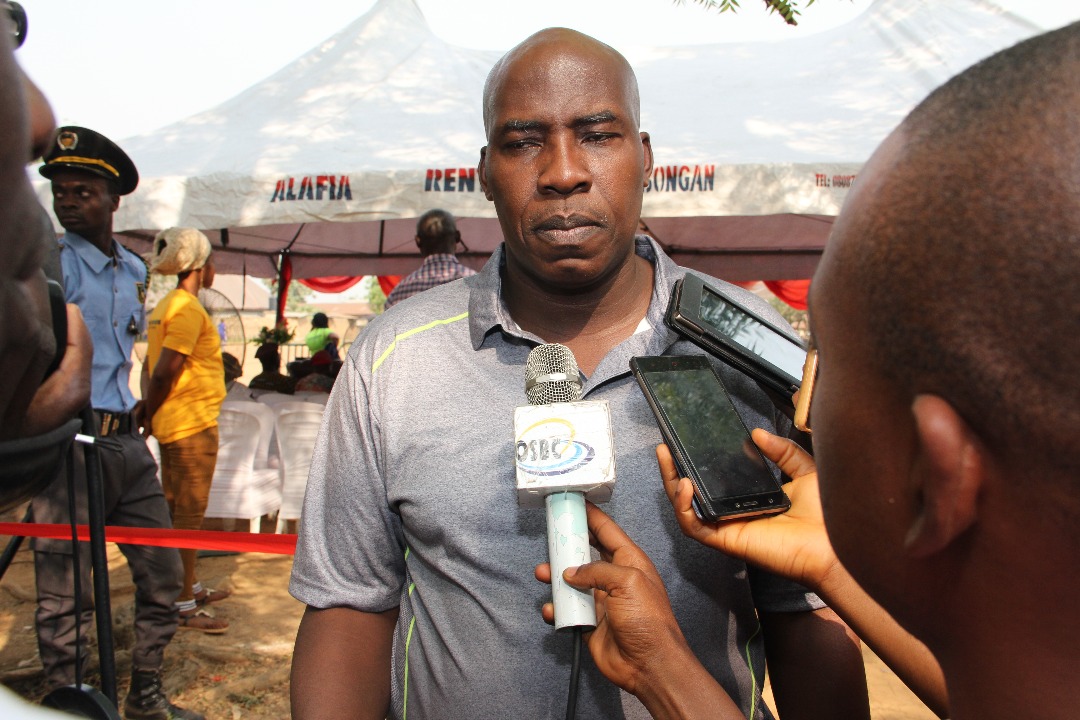
 News4 days ago
News4 days agoMay Day: Babayemi Praises Tinubu Over Salary Increments
-
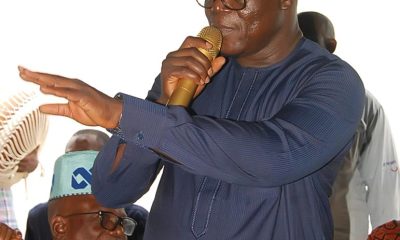
 News3 days ago
News3 days agoNNPP, Kwankwaso Behind Purported Suspension Of APC Nat’l Chairman- Basiru
-
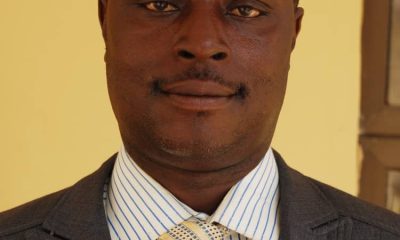
 Opinion4 days ago
Opinion4 days ago…Of Osun Poly, WAEC, NECO, JAMB And Half-Baked Matriculated Products By Tope Abiola
-

 News3 days ago
News3 days agoFracas At Osun Workers Day Rally As Two Factions Of NULGE Clash

